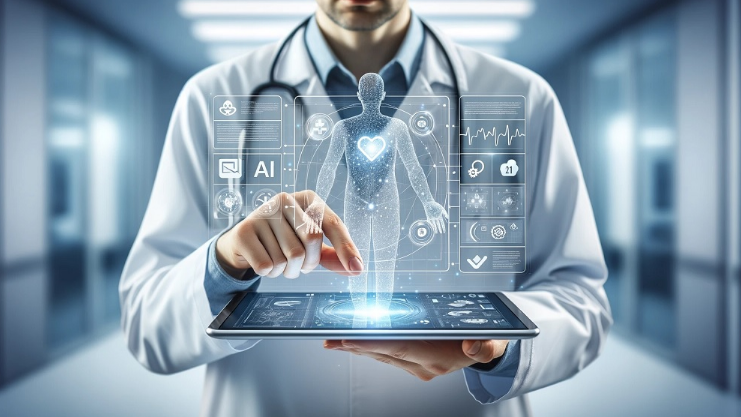Analyzing the Applications and Implications of AI in Healthcare

Introduction
The integration of artificial intelligence (AI) into the healthcare sector is no longer a futuristic concept but a present-day reality. This transformative technology is reshaping how we diagnose diseases, administer treatments, and manage health systems. By leveraging vast amounts of data, machine learning algorithms are offering unprecedented insights that promise to improve patient outcomes and streamline operational efficiencies.
This article provides a detailed analysis of AI’s diverse applications and explores the profound ethical and societal implications that accompany this technological shift, supported by evidence from authentic studies and reports.
AI’s Impact on Clinical Practice
Precision in Diagnostics
One of the most impactful applications of AI is its ability to augment the diagnostic process, often surpassing human capabilities in speed and scale. In medical imaging, AI-powered tools can analyze vast libraries of scans—from X-rays to MRIs—to detect subtle anomalies that might be missed by the human eye.
A recent study published in The Lancet Digital Health demonstrated that an AI algorithm was as effective as two senior radiologists in detecting breast cancer from mammograms, highlighting its potential as a powerful diagnostic aid.
Similarly, in pathology, AI is being trained to analyze tissue slides to classify and grade cancer cells with remarkable accuracy, providing oncologists with crucial information for treatment planning.
Accelerating Drug Discovery and Personalized Medicine
AI is also revolutionizing the discovery and development of new medicines. Drug research is traditionally a slow and costly process, but AI models can analyze molecular structures and genetic data to identify promising drug candidates and predict their potential efficacy and side effects at a fraction of the time. This accelerated process is making new therapies available faster.
Furthermore, AI’s ability to analyze an individual’s unique genetic makeup and health history is paving the way for truly personalized medicine. By correlating genetic markers with disease risk and treatment response, AI can help clinicians select the most effective therapies for each patient, minimizing trial and error and improving outcomes.
Streamlining Operations and Public Health
Improving Administrative Efficiency
Beyond clinical applications, AI is driving significant improvements in the operational side of the healthcare industry. By automating routine tasks, AI frees up valuable time for medical professionals to focus on direct patient care. Examples include:
- Automated Medical Coding and Billing: AI can read clinical notes and assign the appropriate medical codes, reducing errors and accelerating the billing process.
- Predictive Scheduling and Resource Allocation: AI models can forecast patient admission rates and surgical demand, allowing hospitals to optimize staffing and resource distribution.
- Virtual Assistants for Patient Inquiries: AI-powered chatbots handle initial patient inquiries, appointment scheduling, and even medication reminders, improving patient engagement.
Public Health Surveillance
AI’s ability to analyze large datasets from various sources, including social media, news reports, and satellite imagery, makes it a powerful tool for public health surveillance. During recent global health crises, algorithms were used to track the spread of infectious diseases, predict outbreaks, and model the impact of public health interventions.
This has allowed health organizations to respond more quickly and effectively. The field of AI in healthcare is expanding to integrate more of these real-time data streams, providing a clearer picture of public health challenges on a global scale.
See also: How Robotics Is Revolutionizing Healthcare
The Ethical and Social Frontier
Addressing Bias and Algorithmic Fairness
The increasing reliance on AI in healthcare raises critical questions about equity. AI models are only as good as the data they are trained on, and if that data is not diverse, the algorithms can perpetuate or even amplify existing health disparities.
For example, a study in the Proceedings of the National Academy of Sciences found that some AI models for skin cancer detection performed less accurately on individuals with darker skin tones, a result of being trained predominantly on images of lighter skin.
This challenge highlights the ethical responsibility of developers to ensure their AI models are fair and equitable for all patient populations.
Privacy, Security, and Governance
The use of AI necessitates the collection of vast amounts of sensitive patient data, which presents immense challenges for privacy and security. Robust regulatory frameworks like HIPAA and GDPR are essential, but the sheer volume of data makes it a constant target for cyber threats. Furthermore, the use of powerful technologies like artificial intelligence to analyze this data requires transparent and strict governance.
The integration of facial recognition technology, for instance, could be used for patient identification or to monitor for signs of distress in clinical settings. However, its use requires careful ethical consideration and stringent safeguards to protect patient anonymity and data security, ensuring that the benefits of such technology do not come at the cost of fundamental privacy rights.
The Future of Patient-Centric Care
Expanding Access to Mental Health Support
The demand for mental health services often exceeds the supply of professionals. AI-powered chatbots and virtual therapy applications are helping to bridge this gap by providing accessible, on-demand support.
A report by the World Health Organization highlighted the potential of these tools to offer initial support, coping strategies, and mood tracking. While not a replacement for human therapists, these AI platforms can serve as a vital first step for individuals who are hesitant to seek traditional therapy, thereby expanding access and helping to destigmatize mental health assistance.
The Collaborative Model: Human and AI
Perhaps the most important implication of AI in healthcare is that it is a tool to empower, not replace, medical professionals. The future of medicine will be defined by a collaborative model where clinicians utilize AI to assist with complex diagnoses, refine treatment plans, and automate routine tasks. This partnership will allow them to dedicate more of their invaluable time and energy to the essential human aspects of patient care, such as building trust, demonstrating empathy, and engaging in compassionate communication. This synergistic approach ensures that AI enhances, rather than diminishes, the human element that is central to quality healthcare.
Conclusion
The journey of AI in healthcare is marked by immense promise and significant, yet manageable, challenges. Its applications range from revolutionizing diagnostics and personalizing treatment to improving public health access and operational efficiency. However, as we continue to embrace these transformative technological advancements, we must remain vigilant about the ethical and societal implications.
By consistently prioritizing data security, actively addressing algorithmic bias, and fostering a truly collaborative relationship between human expertise and machine intelligence, we can harness the profound power of AI to build a more efficient, equitable, and ultimately healthier future for everyone.




